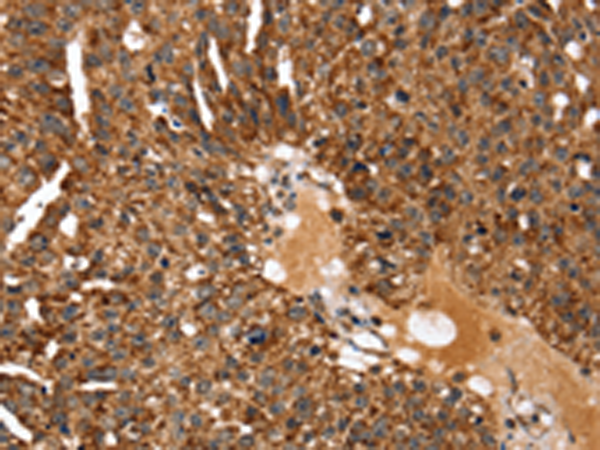

| WB | 咨询技术 | Human,Mouse,Rat |
| IF | 咨询技术 | Human,Mouse,Rat |
| IHC | 1/35-1/150 | Human,Mouse,Rat |
| ICC | 技术咨询 | Human,Mouse,Rat |
| FCM | 咨询技术 | Human,Mouse,Rat |
| Elisa | 1/1000-1/2000 | Human,Mouse,Rat |
| Aliases | ERG2; ERG-2; HERG2; Kv11.2; hERG-2 |
| WB Predicted band size | 110 kDa |
| Host/Isotype | Rabbit IgG |
| Antibody Type | Primary antibody |
| Storage | Store at 4°C short term. Aliquot and store at -20°C long term. Avoid freeze/thaw cycles. |
| Species Reactivity | Human, Rat |
| Immunogen | Fusion protein of human KCNH6 |
| Formulation | Purified antibody in PBS with 0.05% sodium azide and 50% glycerol. |
+ +
以下是关于KCNH6抗体的3篇参考文献,简要概括如下:
---
1. **文献名称**:*KCNH6 Channel Subunit is Critical for Insulin Secretion and Glucose Homeostasis*
**作者**:Zhang et al.
**摘要**:研究通过Western blot和免疫组化技术,使用KCNH6特异性抗体揭示了该钾通道在胰岛β细胞中的表达,并发现其功能缺陷会导致胰岛素分泌异常,与糖尿病病理相关。
2. **文献名称**:*Expression and Functional Role of KCNH6 in Colorectal Cancer Progression*
**作者**:Wang et al.
**摘要**:利用KCNH6抗体进行免疫荧光和流式细胞术分析,发现该蛋白在结直肠癌组织中高表达,并通过调控细胞增殖和迁移促进肿瘤发展,提示其作为潜在治疗靶点。
3. **文献名称**:*Validation of a Novel Anti-KCNH6 Antibody for Cardiac Electrophysiology Studies*
**作者**:Smith et al.
**摘要**:报道了一种新型KCNH6抗体的开发与验证,通过免疫沉淀和免疫印迹证实其特异性,并应用于心脏组织研究,揭示其在心律失常中的潜在作用机制。
---
以上文献均涉及KCNH6抗体的实验应用(如蛋白检测、功能研究或疾病关联分析),覆盖内分泌、肿瘤及心血管领域。如需扩展可进一步检索PubMed或Web of Science。
The KCNH6 antibody is a research tool designed to target the KCNH6 protein, a member of the voltage-gated potassium (Kv) channel family encoded by the *KCNH6* gene. KCNH6. also known as Kv11.3 or HERG3. belongs to the ether-à-go-go (EAG) subfamily and plays a role in regulating cellular electrical activity by mediating potassium ion flux. Structurally, it contains six transmembrane domains and a cyclic nucleotide-binding homology domain, contributing to its function in repolarizing membranes in excitable cells. While its close homologs (e.g., KCNH2/Kv11.1) are well-studied in cardiac electrophysiology, KCNH6 is less characterized but is implicated in neuronal and endocrine systems, with emerging roles in cancer progression, metabolic disorders, and insulin secretion.
KCNH6 antibodies are primarily used in biomedical research to detect and quantify protein expression in tissues or cell lines via techniques like Western blotting, immunohistochemistry, or immunofluorescence. These antibodies help investigate KCNH6's physiological and pathological roles, such as its potential involvement in tumorigenesis or diabetes. Commercially available antibodies are often validated for specificity using knockout controls or peptide-blocking assays. However, researchers must verify cross-reactivity and batch consistency due to sequence similarities within the Kv family. Recent studies suggest KCNH6 may serve as a biomarker or therapeutic target, driving interest in developing high-affinity antibodies for functional studies and diagnostic applications.
×